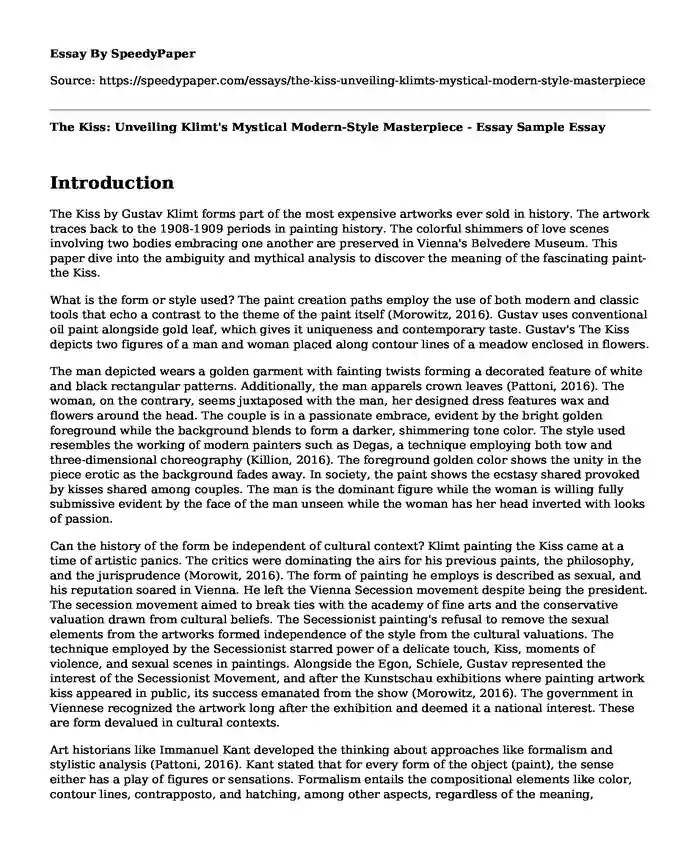Introduction
The Kiss by Gustav Klimt forms part of the most expensive artworks ever sold in history. The artwork traces back to the 1908-1909 periods in painting history. The colorful shimmers of love scenes involving two bodies embracing one another are preserved in Vienna's Belvedere Museum. This paper dive into the ambiguity and mythical analysis to discover the meaning of the fascinating paint- the Kiss.
What is the form or style used? The paint creation paths employ the use of both modern and classic tools that echo a contrast to the theme of the paint itself (Morowitz, 2016). Gustav uses conventional oil paint alongside gold leaf, which gives it uniqueness and contemporary taste. Gustav's The Kiss depicts two figures of a man and woman placed along contour lines of a meadow enclosed in flowers.
The man depicted wears a golden garment with fainting twists forming a decorated feature of white and black rectangular patterns. Additionally, the man apparels crown leaves (Pattoni, 2016). The woman, on the contrary, seems juxtaposed with the man, her designed dress features wax and flowers around the head. The couple is in a passionate embrace, evident by the bright golden foreground while the background blends to form a darker, shimmering tone color. The style used resembles the working of modern painters such as Degas, a technique employing both tow and three-dimensional choreography (Killion, 2016). The foreground golden color shows the unity in the piece erotic as the background fades away. In society, the paint shows the ecstasy shared provoked by kisses shared among couples. The man is the dominant figure while the woman is willing fully submissive evident by the face of the man unseen while the woman has her head inverted with looks of passion.
Can the history of the form be independent of cultural context? Klimt painting the Kiss came at a time of artistic panics. The critics were dominating the airs for his previous paints, the philosophy, and the jurisprudence (Morowit, 2016). The form of painting he employs is described as sexual, and his reputation soared in Vienna. He left the Vienna Secession movement despite being the president. The secession movement aimed to break ties with the academy of fine arts and the conservative valuation drawn from cultural beliefs. The Secessionist painting's refusal to remove the sexual elements from the artworks formed independence of the style from the cultural valuations. The technique employed by the Secessionist starred power of a delicate touch, Kiss, moments of violence, and sexual scenes in paintings. Alongside the Egon, Schiele, Gustav represented the interest of the Secessionist Movement, and after the Kunstschau exhibitions where painting artwork kiss appeared in public, its success emanated from the show (Morowitz, 2016). The government in Viennese recognized the artwork long after the exhibition and deemed it a national interest. These are form devalued in cultural contexts.
Art historians like Immanuel Kant developed the thinking about approaches like formalism and stylistic analysis (Pattoni, 2016). Kant stated that for every form of the object (paint), the sense either has a play of figures or sensations. Formalism entails the compositional elements like color, contour lines, contrapposto, and hatching, among other aspects, regardless of the meaning, contents, or social-historical.
Conclusion
Gustav's The Kiss famous painting shows a commanding transformation of simple acts of ecstatic romance to work of art that out ways a mere kissing scene. The picture uses styles and shapes tracing Vienna around 1908. He succeeds in sidelining the cultural contextualization, and the form adopted by the Secessionist movement remains a historical figure. Immanuel Kant, an art historian, changed the way of thinking in formalism and styles within the artwork.
References
Morowitz, L. (2016). 'Heil the Hero Klimt!': Nazi Aesthetics in Vienna and the 1943 Gustav Klimt Retrospective. Oxford Art Journal, 39(1), 107-129. https://academic.oup.com/oaj/article-abstract/39/1/107/2375510
Pattoni, P. (2016). Due esempi di ricezione omerica tra Otto e Novecento: Giovanni Pascoli e Gustav Klimt. Due esempi di ricezione omerica tra Otto e Novecento: Giovanni Pascoli e Gustav Klimt, 265-287. http://www.academia.edu/download/58237584/Pattoni_AA.2016_Pascoli_Klimt.pdf
Killion, M. (2016). Reverse Tarot: A Representation of Extreme Negative Thinking. 2016 NCUR. http://www.ncurproceedings.org/ojs/index.php/NCUR2016/article/view/2140
Cite this page
The Kiss: Unveiling Klimt's Mystical Modern-Style Masterpiece - Essay Sample. (2023, Nov 30). Retrieved from https://speedypaper.net/essays/the-kiss-unveiling-klimts-mystical-modern-style-masterpiece
Request Removal
If you are the original author of this essay and no longer wish to have it published on the SpeedyPaper website, please click below to request its removal:
- Be Different and Tell Your Story - Essay Sample with a Speech Analysis
- Paper Example on Reporting Evaluation Results and Ethics
- Essay Example on Talking About Rap and Its Origin
- Paper Example. Importance of a Strong Company Culture
- Music and Its Effects: A Free Literature Review Example
- Case of Trevor vs. Arthur. Free Essay
- Free Paper Sample on Organizational Culture
Popular categories





